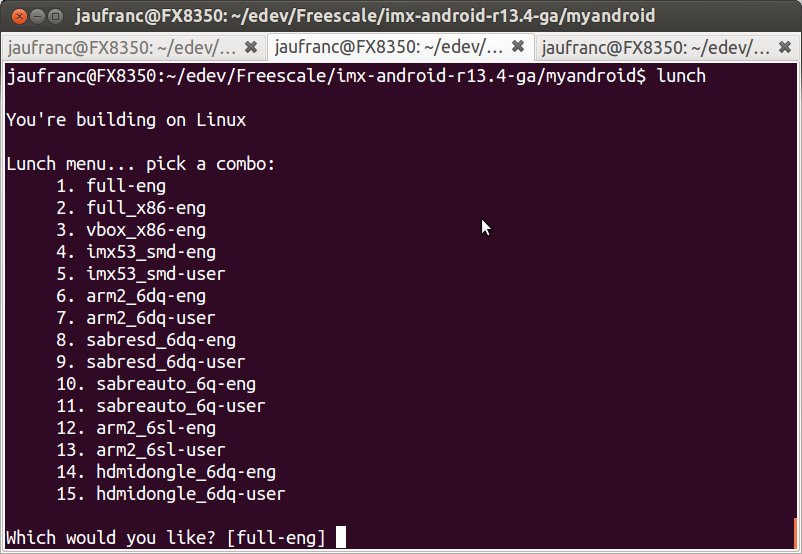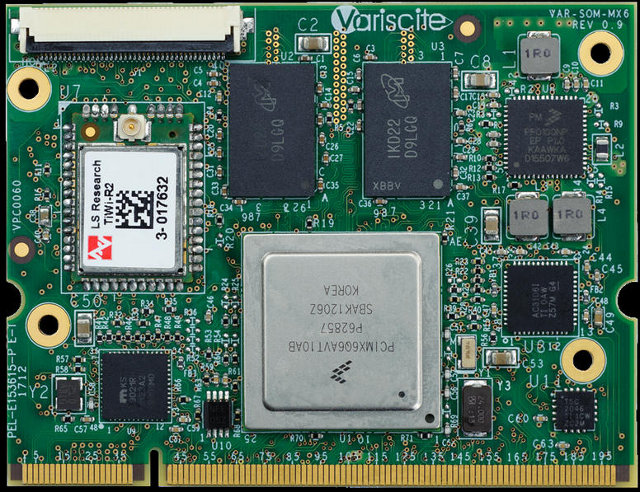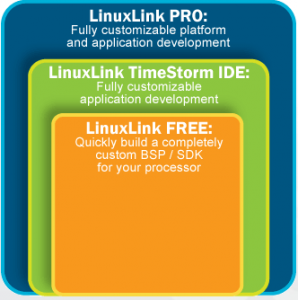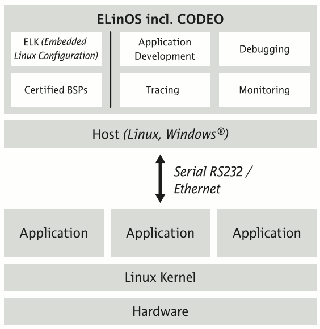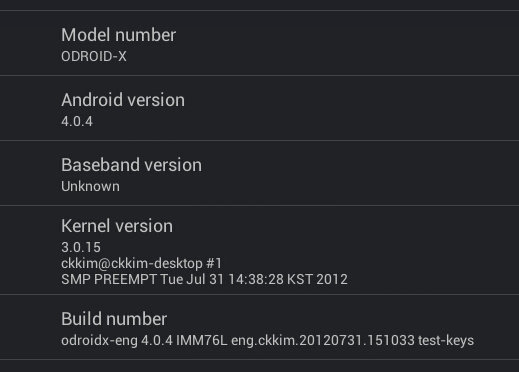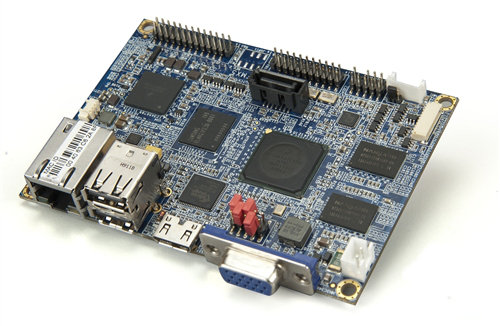We can now get some quad core Android mini PCs (e.g. Hi802, GK802) featuring Freescale i.MX6Q processor, Freescale has released full documentation and source code its development platforms, Hi802 / GK802 HDMI TV dongles are easily hackable, and there’s even an Ubuntu image for the devices. So it looks pretty good ,right? Well almost.. there are some patches and config for GK802 that have not been released by Richtechie, so we can’t modify the bootloader and Linux kernel. But this may change, as ARMTvTech forum user hste noticed some Freescale i.MX6 HDMI dongle patches om IMX Community website. Even though I’m not sure those are fully compatible with Hi802 / GK802, this could be a starting point. Today, I’ll provide the instructions to build u-boot, the linux kernel and Android ICS with those patches in a machine running Linux 12.04 64-bit. Patch Sets Descriptions There are two set of patches that […]
Variscite VAR-SOM-MX6 Freescale i.MX 6 Solo, Dual and Quad System on Modules Start at $59
Variscite has unveiled a new series of system on modules powered by Freescale i.MX6 Solo, Dual, DualLite and Quad processors with 512 to 2048 MB DDR3 RAM, and 128 to 1024MB SLC NAND Flash. Here are the modules key features: SoC – Freescale i.MX 6 series SoC (Single/Dual /Quad ARM® Cortex™-A9 Core, 1.2 Ghz) System Memory • Up to 16 Gb DDR3 RAM Storage – Up to 8 Gb NAND Flash for storage memory/boot Video Output: 2 x LVDS display interface HDMI V1.4 i nterface 1 x MIPI DSI Touch panel interface Camera – Parallel & serial camera interface (CSI) Connectivity On-board 10/100/1000 Mbps Ethernet PHY WLAN (802.11 b/g/n) Bluetooth 2.1 + EDR USB – 1 x USB 2.0 host, 1 x OTG Audio – Stereo line -In/out, digital & analog microphone, and S/PDIF In/Out Other interfaces: 2 x SD/MMC Serial interfaces ( SPI , I2C, UART, I2S,) 2x CAN […]
The Yocto Project Release 1.3
The Yocto Project Release 1.3 has just been announced. This release codenamed “Danny” and based on Poky 8.0 is the fifth release of the project. The Yocto Project is a framework to assist developers in creating embedded Linux distributions. New features and updates for the Yocto Project 1.3 Improved terminal UI, which makes it easy to see the tasks that are currently executing, and avoids burying any warnings that are printed. Eliminated intermediate step when building cross compiler toolchain Relocatable SDK Large number of usability improvements in the Hob image building UI Upgraded eglibc to version 2.16 Upgraded gcc to version 4.7 Upgraded Linux kernel version to 3.4.11 Added yocto-bsp script for automating the initial parts of creating a new BSP Python functions now consistently use four spaces for indentation – no more having to try to match the mix of tabs and spaces in your recipes Disabled sharing shared […]
uClinux on Cortex-M3/M4 MCU: The Costs, Performance and Power Consumption
I previously wrote about different options available to run Linux on Cortex M3 & M4 Microcontrollers, and more recently Vladimir Khusainov, co-founder and Director of Engineering at Emcraft Systems,wrote a longish article entitled “Practical Advice on Running uClinux on Cortex-M3/M4” on electronicdesign.com, where he explains how SoM are usually selected, the costs of running uClinux on Cortex M3/M4 MCUs such as Freescale K70 or STmicroelectronics STM32F2/F4, as well as performance and power consumption considerations. First, Vladimir addresses one comment that says there’s basically no use for uClinux on Cortex M3/M4 MCU, since external memory is needed and an ARM7/ARM9 modules (with MMU) can be purchased for almost the same price. There are 2 counter arguments to this point of view: In practice, customers usually select an hardware platform first, then think what OS can be used on the platform. For example, if a company decided to use an hardware based […]
Timesys Unveils LinuxLink BSP/SDK for MityARM-3359 SoM (TI AM335x)
Critical Link is an electronics product development company that provides “MityDSP” and “MityARM” System on Modules and Timesys is a software company working on Embedded Linux, which provides LinuxLink, a software development framework for embedded Linux application development. Both companies have partnered to offers LinuxLink BSP/SDK for MityARM-3359 SoM based on Texas Instruments Sitara AM335x Cortex A9 processor. LinuxLink (for MityARM-335x) comes in 2 versions: A free version which includes: A wizard-based interface that simplifies the selection of a Linux kernel, software packages and tools Kernel, toolchain and debugger Access to hundreds of open-source software packages Support by Timesys for build/boot issues. A PRO version (Starts at $5495 per developer) which includes extra “features” such as: TimeStorm IDE – A desktop-based development environment Tools for advanced customization and integration unmetered support Everything is built on Timesys servers, but the web interface makes it quite customizable and offers lots of options […]
SYSGO Releases ELinOS 5.2 Industrial Grade Linux
SYSGO, a software company for the real-time and embedded markets, has announced the release of ELinOS 5.2, an Industrial Grade Linux distribution, updated to kernel 3.2 and with new features related to scheduling, memory management, file systems, networking and security. The new 5.2 version brings the following improvements: Integration of new kernel 3.2 to support new features and availability of previous versions of kernels 2.6.33 and 2.6.34, to respond to customers demand. Real-time extension based on Open Source Automation Development Lab (OSADL) implementation (PREEMPT RT) especially designed and tested for industrial needs. Support for latest embedded CPUs including Intel, Freescale QorIQ, ARM Cortex, TI OMAP 4, Freescale i.MX6 and MIPS. SMP (Symmetric multiprocessing) support on all multi-core platforms. QEMU simulator supported for all architectures. New functionality support in areas of graphics (i.e. AMD Llano Fusion APUs), Wi-Fi (i.e. Intel iwlwifi 105 and 135), SATA (i.e. Intel C600 serial-attached-scsi controller), USB […]
HardKernel ODroid-X Review with Android 4.0.4
Following my ODroid-X unboxing and first boot post, I planned to review ODroid-X board with both Android and Ubuntu. However, I found out that an Ubuntu image will only be released later this week, so I’ll focus on Android review for today, and try Ubuntu once it becomes available. The default firmware come with a few standards applications, and an ODROID app that: Provide links to developer resources Features a file explorer Has a WiFi section that show WiFi information such as signal strength and let you test the network performance Has a GPS section (useless for this board) Has a Sensor section, but there are none in ODROID-X. Has a camera section that let you show the camera input. It works with the module provided Has a others section with 3D compass test (not used for ODROID-X) The Dev Tools application is also installed. But there was not really […]
VIA Announces VIA VAB-800 Pico-ITX Board Based on Freescale i.MX537 Processor
VIA Technologies has announced the VIA VAB-800 Pico-ITX board powered by a Freescale i.MX537 (ARM Cortex A8) processor clocked at 800MHz or 1GHz depending on the requirements, with 1GB DDR3-800 SDRAM and support for eMMC Flash with a capacity of up to 64 GB. The VIA VAB-800 is an industrial board that can operate in a wide temperature range and targets high-end industrial and in-vehicle embedded applications. Here are the specs of the board: Processor – Freescale Cortex-A8 single core iMX537 @800MHz System Memory – 1GB DDR3-800 SDRAM, using 128M x16 memory devices Flash – eMMC Flash, up to 64GB Graphics – Supports two independent, integrated graphics processing units: an OpenGL® ES 2.0, 3D graphics accelerator and an OpenVG™ 1.1 2D graphics accelerator Ethernet – SMSC LAN8720A 10/100 PHY transceiver with HP Auto-MDIX support Audio – Freescale SGTL5000 low power stereo codec with headphone amp HDMI – Silicon image SiI9024A […]


